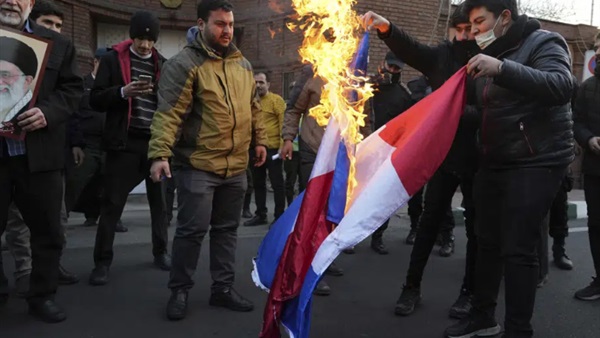Amid unrest, Iran’s hardliners turn their anger to France

Iranian hardliners on Sunday burned French flags outside the
French embassy in Tehran, protesting cartoons published by the French satirical
magazine Charlie Hebdo that lampoon Iran’s ruling clerics.
The caricatures were published at a time of persistent
anti-government protests in Iran, now in their fourth month. Demonstrators are
calling for the downfall of its Islamic Republic and are challenging its
hardline establishment.
The demonstrations outside of the French embassy follow
previous attempts by Iran’s rulers to mobilize their supporters in
counter-demonstrations.
Hundreds of protesters, including students from seminary
schools, shouted “Death to France” and accused French President Emmanuel Macron
of insulting Iran while urging Paris to stop “animosity” toward Tehran. Police
officers, some of whom appeared to be holding images of Iranian Supreme Leader Ayatollah
Ali Khamenei, kept the demonstrators at a distance from the embassy building.
State television said some clerics held similar protests in
the shrine city of Qom, the center of religious learning in Iran.
Iranian parliamentary speaker Mohammad Bagher Qalibaf on
Sunday linked the French magazine’s cartoons with what officials have
repeatedly alleged is the West’s plot to spread purported riots in Iran.
Later in the day, President Ebrahim Raisi offered his first
reaction to the French cartoons and echoed similar claims. “Resorting to
insults on the pretext of freedom is a clear indication of their frustration in
concluding plot for chaos and insecurity” in Iran, he said.
Charlie Hebdo has a long history of publishing vulgar
cartoons mocking Islamists, which critics say are deeply insulting to Muslims.
Two French-born al-Qaida extremists attacked the newspaper’s office in 2015,
killing 12 cartoonists, and it has been the target of other attacks over the
years.
Its latest issue features the winners of a recent cartoon
contest in which entrants were asked to draw the most offensive caricatures of
Supreme Leader Khamenei.
One of the finalists depicts a turbaned cleric reaching for
a hangman’s noose as he drowns in blood, while another shows Khamenei clinging
to a giant throne above the raised fists of protesters. Others depict more
vulgar and sexually explicit scenes.
Anti-government protests erupted across Iran in September
after the death in custody of Mahsa Amini, a 22-year-old woman who had been
detained by the country’s morality police for allegedly violating its strict
Islamic dress code.
The unrest has grown into one of the severest challenges to
the Islamic Republic since the 1979 revolution that brought it to power. Human
rights groups say that at least 517 protesters have been killed and over 19,200
people have been arrested amid a violent crackdown by security forces. Iranian
authorities have not provided an official count of those killed or detained.
On Saturday, authorities executed two men convicted of
allegedly killing a paramilitary volunteer in the demonstrations.
The Saturday hangings brought to four the number of people
known to have been executed since the unrest began in September over the death
of Amini. All of the sentences were handed out in rapid, closed-door trials
that have been met with international criticism.
Sunday was also the third anniversary of the Iranian
Revolutionary Guard’s downing of an Ukrainian passenger plane with two
surface-to-air missiles, killing all 176 people on board — a tragedy that
ignited an outburst of anger across Iran. Tehran initially denied
responsibility for downing the plane before admitting to having mistakenly done
so amid high tensions with the U.S.
An Iranian court has yet to issue a verdict three years into
the trial of 10 military personnel who have not been publicly identified but
are allegedly implicated in the plane’s downing.
Families of the victims met on Sunday at the site of the
crash to hold a memorial ceremony separately from an official commemoration
organized at Tehran’s international airport, which had been the point of
departure for the flight.
In a separate development on Sunday, a court sentenced
Faezeh Hashemi, daughter of former president Akbar Hashemi Rafsanjani, to a
five-year prison term for “propaganda against the system,” Iranian media
reported.
The outspoken and pro-reform Hashemi has been in prison
since late September after she was arrested by security forces for supporting
protests that have been led by women opposing the mandatory headscarf or hijab
under the Islamic Republic.
In 2011, Hashemi was convicted and served five years in
prison over similar security charges.
Iranian officials have continued to claim the months-long
protests are being driven by foreign agents but have offered no proof.
Following Charlie Hebdo’s publishing of cartoons mocking
Iranian clerical figures, authorities in Tehran shut down on Thursday a
decades-old French research institute and called the closure a “first step” in
their response.





